
Mesa Verde National Park: The Ancient Cliff Dwellings of Colorado
Mesa Verde National Park, located in the southwestern corner of Colorado, is a unique and awe-inspiring destination that offers a glimpse into the lives of the Ancestral Puebloans who lived here over 700 years ago. The park is renowned for its well-preserved cliff dwellings, which are some of the most notable and best-preserved archaeological sites in the United States. Visitors can explore these ancient structures, built into the sides of cliffs, and imagine what life was like for the people who once called this place home. In addition to the cliff dwellings, Mesa Verde National Park boasts a diverse landscape that includes mesas, canyons, and forests. The park covers more than 52,000 acres and offers a variety of outdoor activities, including hiking, wildlife viewing, and stargazing. The park's visitor center provides detailed information about the history and culture of the Ancestral Puebloans, as well as maps and guides to help visitors make the most of their visit. Whether you're an archaeology enthusiast, a nature lover, or simply looking for a unique and educational experience, Mesa Verde National Park has something to offer. The park's dramatic scenery and rich history make it a must-visit destination for anyone traveling to Colorado.
Local tips in Mesa Verde National Park
- Visit early in the morning or late in the afternoon to avoid the crowds and the heat.
- Make sure to book guided tours in advance, as they can fill up quickly.
- Wear comfortable walking shoes and bring plenty of water, as some of the trails can be challenging.
- Don't miss the Mesa Top Loop, which offers great views and easy access to several archaeological sites.
- Check the park's schedule for ranger-led programs and activities to enhance your visit.
- Remember that the altitude is high, so take it easy if you're not used to it and allow time to acclimate.
Mesa Verde National Park: The Ancient Cliff Dwellings of Colorado
Mesa Verde National Park, located in the southwestern corner of Colorado, is a unique and awe-inspiring destination that offers a glimpse into the lives of the Ancestral Puebloans who lived here over 700 years ago. The park is renowned for its well-preserved cliff dwellings, which are some of the most notable and best-preserved archaeological sites in the United States. Visitors can explore these ancient structures, built into the sides of cliffs, and imagine what life was like for the people who once called this place home. In addition to the cliff dwellings, Mesa Verde National Park boasts a diverse landscape that includes mesas, canyons, and forests. The park covers more than 52,000 acres and offers a variety of outdoor activities, including hiking, wildlife viewing, and stargazing. The park's visitor center provides detailed information about the history and culture of the Ancestral Puebloans, as well as maps and guides to help visitors make the most of their visit. Whether you're an archaeology enthusiast, a nature lover, or simply looking for a unique and educational experience, Mesa Verde National Park has something to offer. The park's dramatic scenery and rich history make it a must-visit destination for anyone traveling to Colorado.
When is the best time to go to Mesa Verde National Park?
Iconic landmarks you can’t miss
Cliff Palace
Unveil the mysteries of Cliff Palace, the largest cliff dwelling in North America, and explore the rich heritage of the Ancestral Puebloans in stunning Mesa Verde.
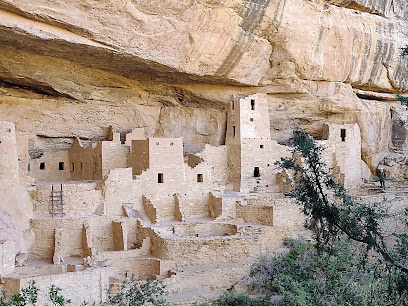
Balcony House
Discover the ancient cliff dwellings of Balcony House in Mesa Verde National Park, where history meets stunning natural beauty.
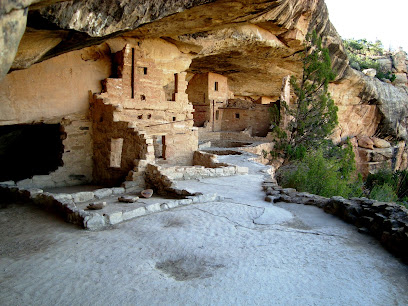
Step House
Discover the ancient cliff dwellings of Step House in Mesa Verde National Park, a must-visit historical landmark showcasing Puebloan heritage.
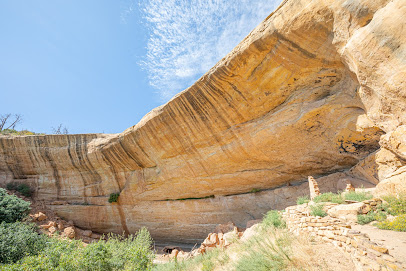
Sun Temple
Explore the Sun Temple at Mesa Verde, a stunning archaeological site revealing the ancient legacy of the Ancestral Puebloans amidst breathtaking landscapes.
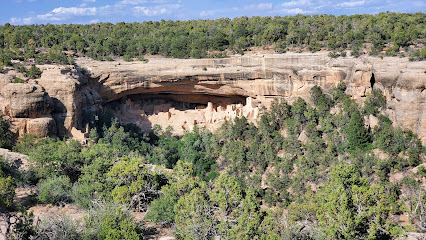
Spruce Tree House
Explore the breathtaking Spruce Tree House in Mesa Verde National Park, an archaeological marvel showcasing the legacy of the Ancestral Puebloans amidst stunning Colorado landscapes.
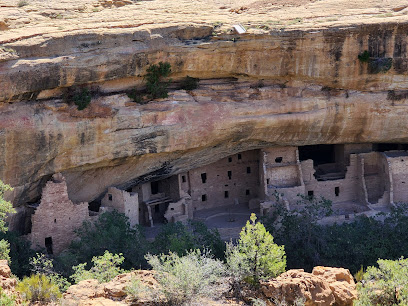
Square Tower House
Discover the history and beauty of Square Tower House, a stunning ancient ruin in Mesa Verde National Park that showcases Ancestral Puebloan architecture.
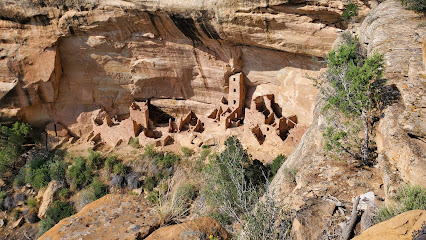
Far View House
Explore the rich history and breathtaking views at Far View House in Mesa Verde National Park, a remarkable archaeological site of the Ancestral Puebloans.
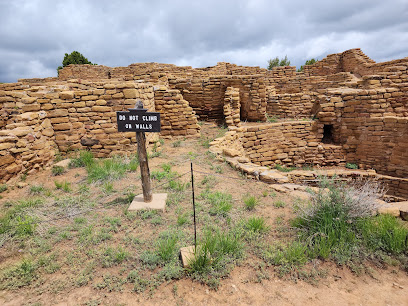
Petroglyph Point Trail
Explore the stunning Petroglyph Point Trail in Mesa Verde National Park, where history meets breathtaking landscapes and ancient rock art awaits.
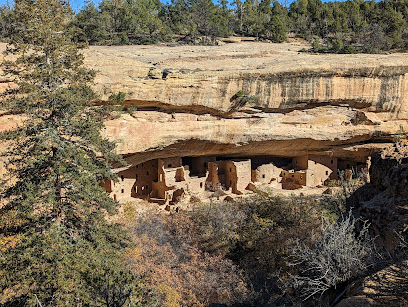
Mesa Verde Park Headquarters
Explore the stunning Mesa Verde Park Headquarters, a UNESCO World Heritage site rich in Native American history and breathtaking landscapes.
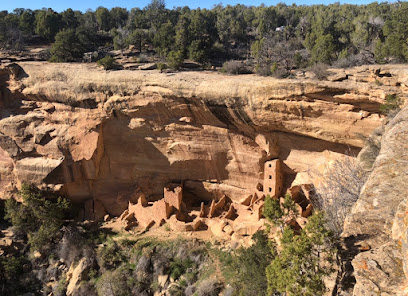
Navajo Canyon View
Discover the stunning vistas of Navajo Canyon View in Mesa Verde National Park, where nature's beauty and tranquility await.
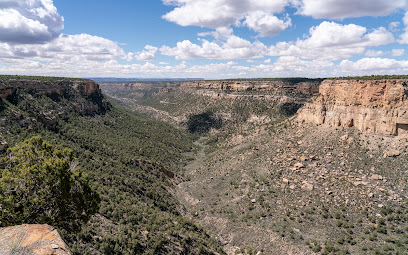
Mesa Top Sites
Discover the ancient Ancestral Puebloan culture at Mesa Top Sites in Mesa Verde National Park, a breathtaking historical landmark in Colorado.
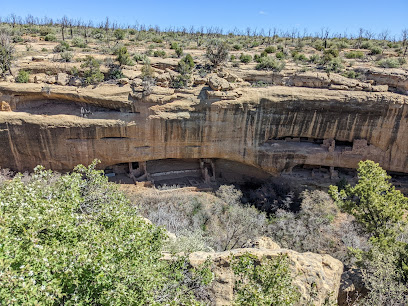
Mesa Verde Administrative District
Discover the ancient cliff dwellings and rich cultural history of Mesa Verde, a UNESCO World Heritage Site in Colorado, USA.
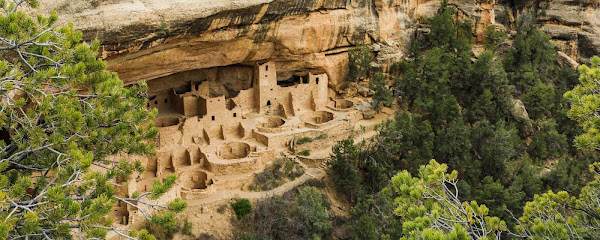
Unmissable attractions to see
Mesa Verde Visitor & Research Center
Discover Ancestral Puebloan history and plan your Mesa Verde adventure at the park's central visitor hub.
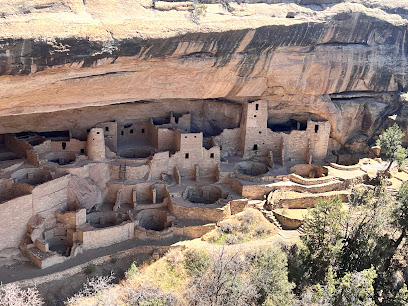
Cliff Palace
Explore the ancient Cliff Palace, the largest cliff dwelling in North America, and step back in time to experience Ancestral Puebloan life in Mesa Verde.
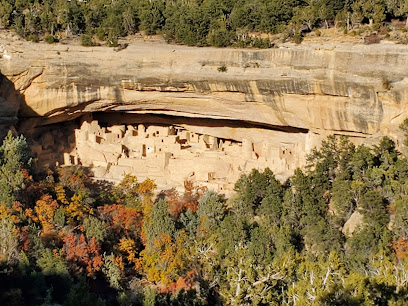
Chapin Mesa Archeological Museum
Discover the ancient world of the Ancestral Pueblo people at Mesa Verde's Chapin Mesa Archeological Museum.
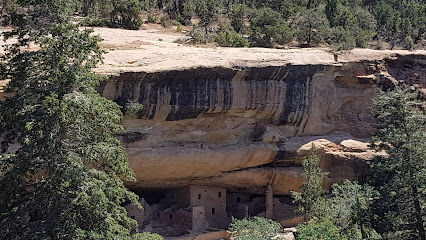
Balcony House
Explore Balcony House in Mesa Verde: A thrilling adventure into Ancestral Puebloan history and architecture.
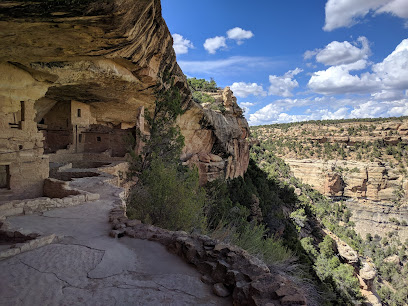
Step House
Discover the unique blend of ancient cultures at Step House, Mesa Verde National Park's fascinating self-guided cliff dwelling.
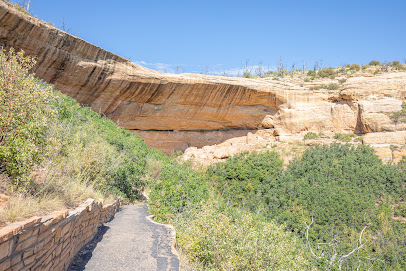
Sun Temple
Explore the mysteries of the Sun Temple, an Ancestral Puebloan ceremonial site in Mesa Verde National Park, offering stunning views and archaeological intrigue.
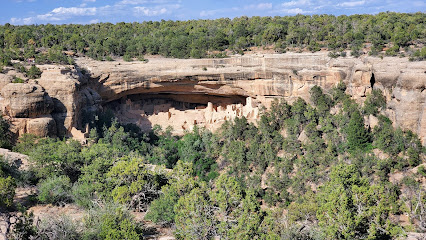
Spruce Tree House
Discover the ancient cliff dwellings of Spruce Tree House in Mesa Verde National Park, a window into the lives of the Ancestral Puebloans.
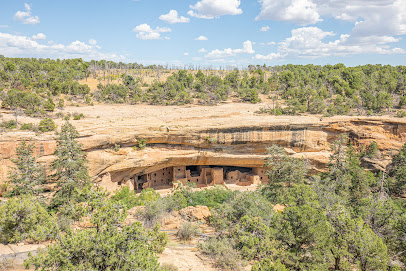
Square Tower House
Discover the architectural marvel of Square Tower House, Mesa Verde's tallest and best-preserved cliff dwelling, showcasing Ancestral Puebloan ingenuity.
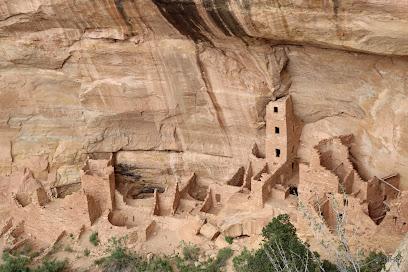
Wetherill Mesa Information
Discover ancient cliff dwellings and mesa-top villages at Wetherill Mesa, offering a unique glimpse into Ancestral Puebloan life in Mesa Verde National Park.
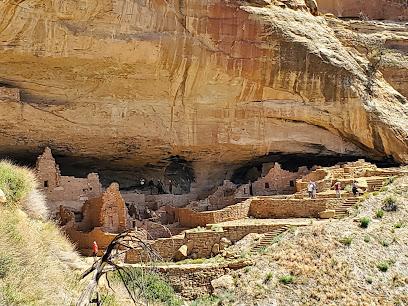
Square Tower House
Discover Mesa Verde's Square Tower House: An intimate ranger-led tour into an Ancestral Puebloan cliff dwelling featuring the park's tallest structure.
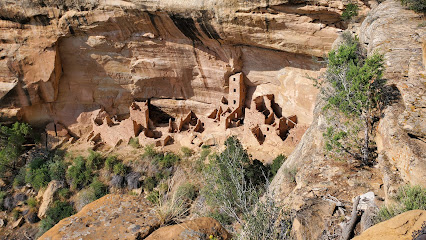
Long House
Explore Long House, Mesa Verde's second-largest cliff dwelling, and step back in time to discover the lives of the Ancestral Puebloans.
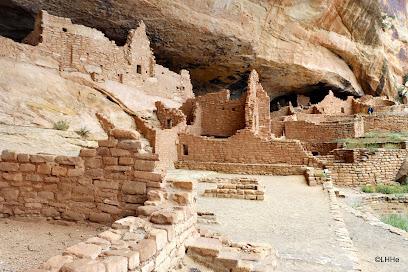
Far View House
Explore the ancient Ancestral Puebloan ruins at Far View House in Mesa Verde National Park, a captivating blend of history and breathtaking scenery.
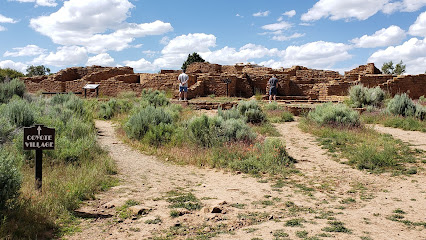
Petroglyph Point Trail
Explore ancient rock art and stunning canyon views on the Petroglyph Point Trail in Mesa Verde National Park. A journey through time!
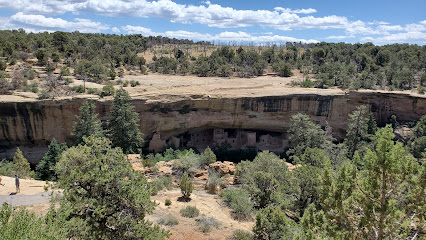
Sun Point View
Witness stunning panoramic views of ancient Puebloan cliff dwellings from this easily accessible overlook in Mesa Verde National Park.
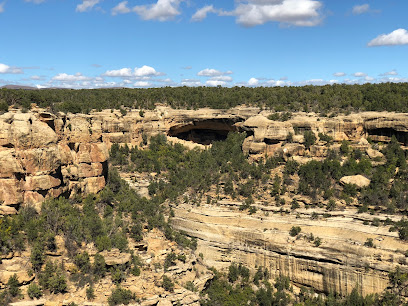
Mesa Verde Park Headquarters
Discover the heart of Mesa Verde National Park, where Ancestral Puebloan history comes to life.
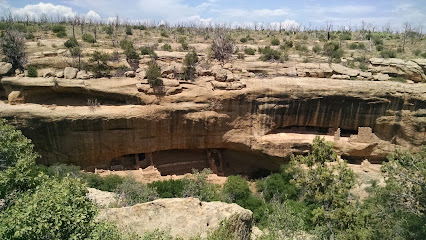
Essential places to dine
Far View Terrace Café / Gift Shop / Mesa Mocha
Experience delicious American cuisine with stunning views at Far View Terrace Café in Mesa Verde National Park.
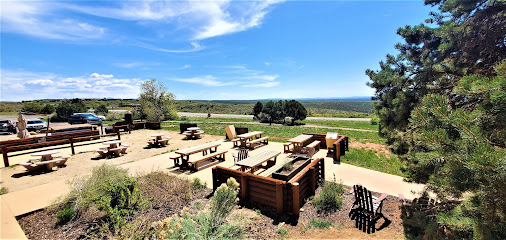
Spruce Tree Terrace Café
Discover the flavors of America at Spruce Tree Terrace Café in Mesa Verde National Park – where delicious food meets stunning natural beauty.
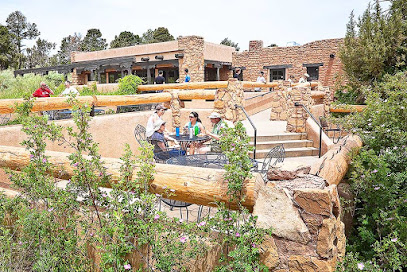
Markets, malls and hidden boutiques
Cliff Palace
Explore Cliff Palace, an exquisite archaeological site in Mesa Verde National Park, revealing the rich history of the Ancestral Puebloans amidst breathtaking landscapes.
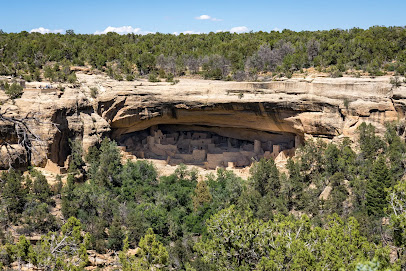
Notah Dineh Trading Co
Discover authentic Native American art and crafts at Notah Dineh Trading Co, a unique gift shop, art gallery, and museum in Cortez, Colorado.
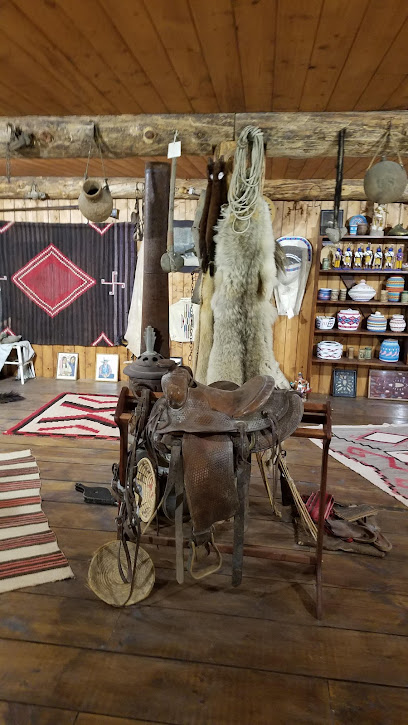
Chapin Mesa Archeological Museum
Discover the ancient Pueblo culture at Chapin Mesa Archeological Museum in Mesa Verde National Park, where history comes alive through artifacts and exhibits.
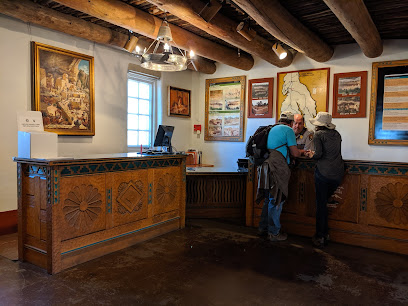
Far View Terrace Café / Gift Shop / Mesa Mocha
Experience the perfect blend of American cuisine and breathtaking views at Far View Terrace Café in Mesa Verde National Park.
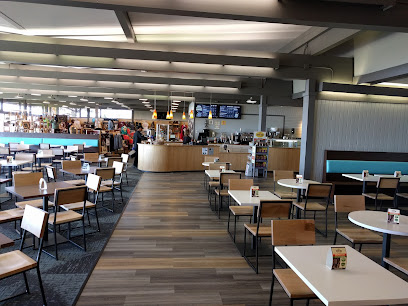
Antique Corral
Explore the Antique Corral in Cortez, CO - a hidden gem filled with vintage treasures and unique collectibles for every enthusiast.
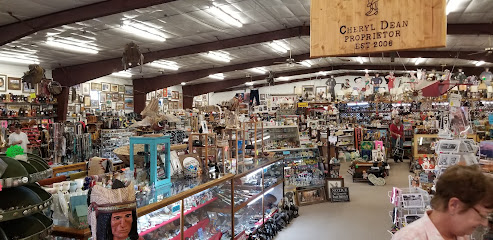
Spruce Tree House
Explore the historical marvels of Spruce Tree House in Mesa Verde National Park, a stunning archaeological site where ancient cultures come to life.
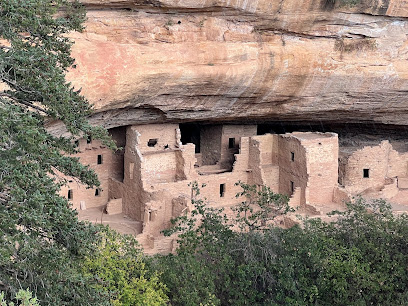
Mud Creek Hogan Trading Post
Discover authentic Native American crafts and rich cultural heritage at Mud Creek Hogan Trading Post in scenic Mancos, Colorado.
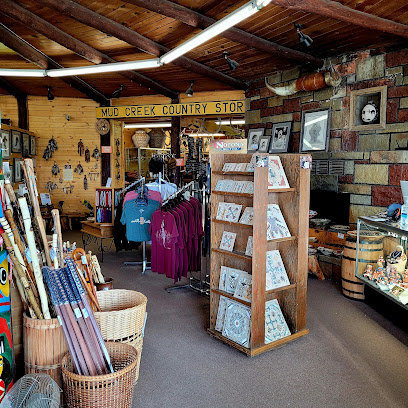
Petroglyph Point Trail
Explore the Petroglyph Point Trail in Mesa Verde National Park, where ancient rock art meets breathtaking landscapes for an unforgettable hiking experience.
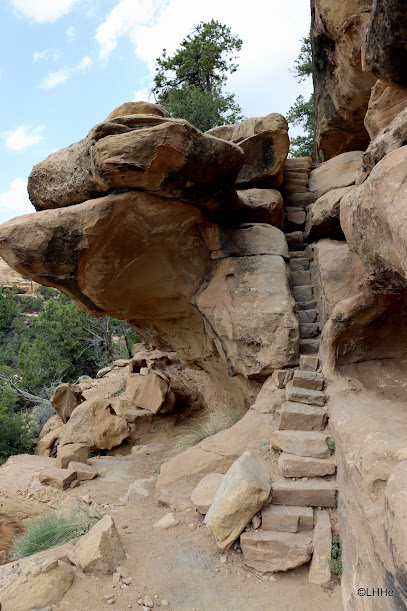
High Desert Life Outdoors & Exchange
Discover the ultimate outdoor gear and local treasures at High Desert Life Outdoors & Exchange in Cortez, Colorado.
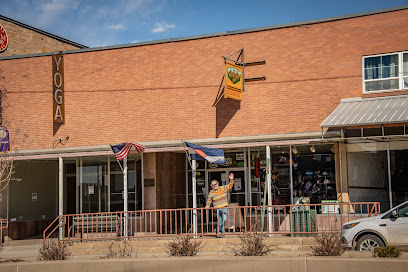
Thunderbird Trading Company
Explore authentic Native American crafts and gifts at Thunderbird Trading Company in Cortez, Colorado, a cultural gem for discerning travelers.
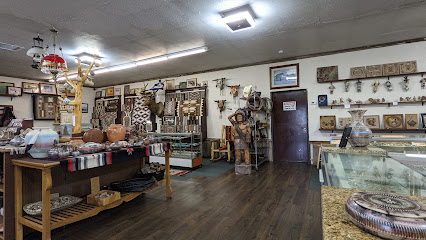
Mesa Verde Park Headquarters
Uncover the ancient mysteries of the ancestral Puebloans at Mesa Verde Park Headquarters, a captivating history museum immersed in stunning Colorado landscapes.
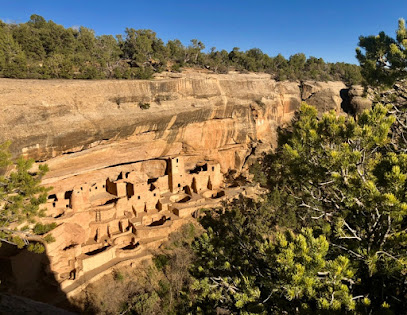
Cliffrose Garden Center & Gifts
Explore nature's beauty at Cliffrose Garden Center & Gifts, where unique plants meet thoughtful gifts in the heart of Cortez, Colorado.
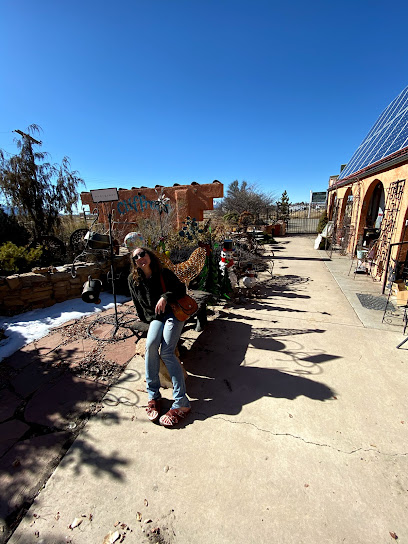
Merriweather Home + Market
Explore Merriweather Home + Market in Cortez, CO, for unique gifts, local crafts, and a boutique shopping experience that captures the heart of Colorado.
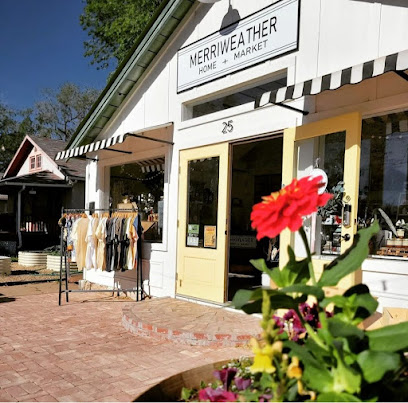
Love On A Hanger
Explore Love On A Hanger in Cortez, CO for unique women's fashion, accessories, and gifts that capture the essence of local style and charm.

LaDawn's
Explore LaDawn's Consignment Shop in Cortez, Colorado, for unique finds and vintage treasures that showcase local culture and charm.

Essential bars & hidden hideouts
J Fargo's Family Dining & Micro Brewery
Experience the best of traditional American cuisine and craft brews at J Fargo's Family Dining & Micro Brewery in Cortez, Colorado.
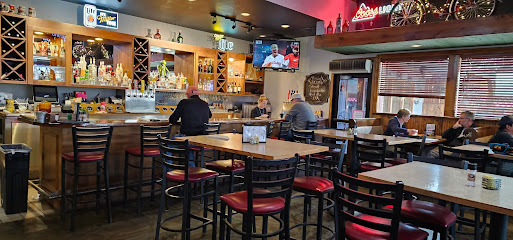
Loungin' Lizard
Experience the vibrant atmosphere and unique flavors of Loungin' Lizard, a top dining destination in Cortez, Colorado.
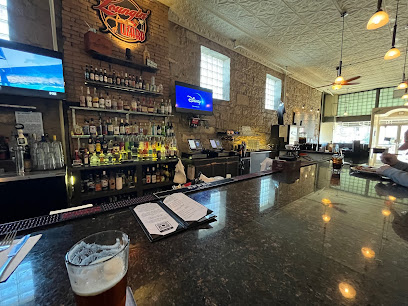
Chavolo's Mexican Restaurant
Experience the vibrant flavors of Mexico at Chavolo's Mexican Restaurant in Mancos, Colorado - a must-visit dining destination for tourists.
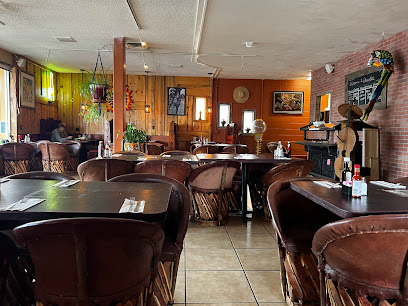
Main Street Brewery & Restaurant
Experience the essence of Colorado craft brewing at Main Street Brewery & Restaurant, where delicious food meets artisanal beers in Cortez.
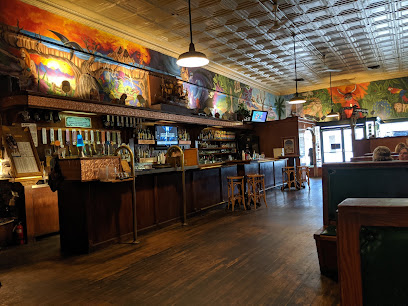
Fiesta Mexicana Restaurant Cortez
Experience authentic Mexican flavors at Fiesta Mexicana Restaurant in Cortez, where every meal is a celebration of culture and community.
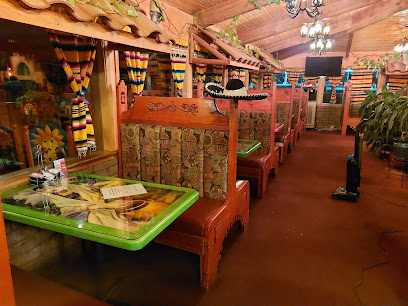
Blondies Trophy Room
Discover the vibrant flavors of Blondies Trophy Room, a beloved grill in Cortez, Colorado, offering delicious meals in a welcoming atmosphere.
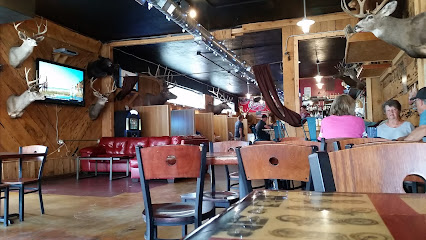
Balcony House
Explore Balcony House, an extraordinary cliff dwelling in Mesa Verde National Park, showcasing the ancient legacy of the Ancestral Puebloans amidst stunning Colorado landscapes.
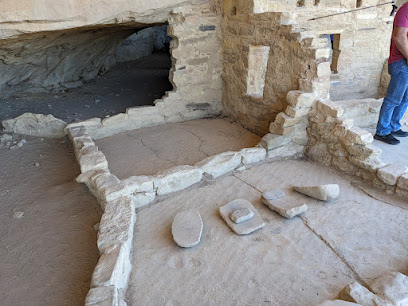
WildEdge Brewing Collective
Discover the rich flavors of craft beer at WildEdge Brewing Collective, a must-visit brewpub in Cortez, Colorado, offering a unique selection and vibrant atmosphere.
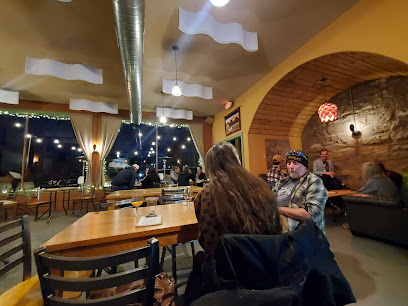
Far View Terrace Café / Gift Shop / Mesa Mocha
Experience the blend of American cuisine and stunning views at Far View Terrace Café in Mesa Verde National Park.
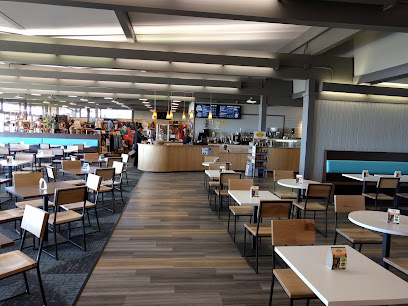
The Wigglin’ Pig
Experience the heart of Cortez at The Wigglin’ Pig, where delicious breakfast dishes and a warm atmosphere await every visitor.
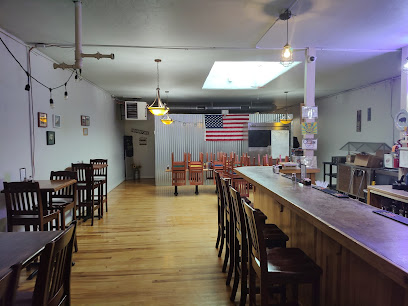
Fenceline Cider
Experience the taste of Colorado at Fenceline Cider, where handcrafted ciders and local flavors come together in a picturesque setting.
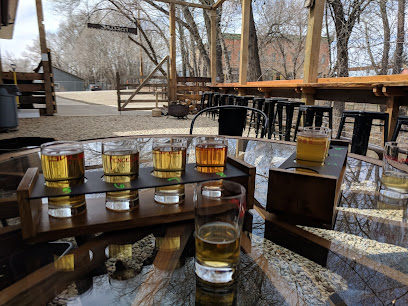
Columbine Bar & Grill
Experience the flavors of Colorado at Columbine Bar & Grill, where delicious grilled dishes meet a cozy, welcoming atmosphere.
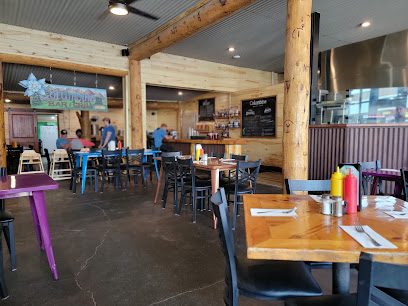
Mancos Brewing Company
Discover the essence of craft brewing at Mancos Brewing Company, where unique flavors meet a vibrant atmosphere in beautiful Colorado.
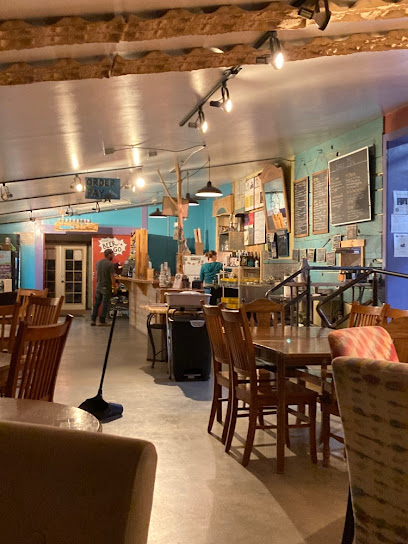
Angel's End Zone Sports Bar
Discover the vibrant atmosphere of Angel's End Zone Sports Bar in Cortez, Colorado, where delicious food and sports unite for an unforgettable experience.
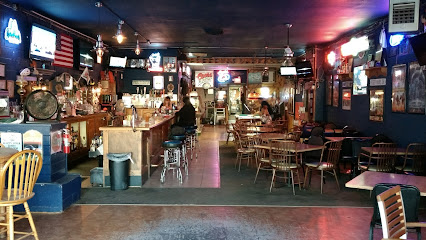
Spruce Tree House
Discover the rich history and breathtaking beauty of Spruce Tree House in Mesa Verde National Park, a remarkable archaeological treasure in Colorado.
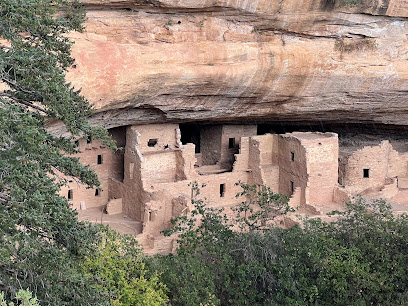
Local Phrases about Mesa Verde National Park
-
- HelloYá'át'ééh
[yah-ah-tay] - GoodbyeHágoónee'
[hah-goo-neh] - YesAoo'
[ah-oh] - NoDoo'
[doh] - Please/You're welcomeAhe'hee'
[ah-hay-hee] - Thank youAhéhee'
[ah-hay-hee] - Excuse me/SorryT'áá hwó' ají t'éego
[taa-hwo-ah-jee-tay-go] - How are you?Yá'át'ééh?
[yah-ah-tay?] - Fine. And you?Bááh. Ak'é'é?
[bah-ah-ah-kay] - Do you speak English?Shí éí Dóó Nitsaa?
[shee-ee-doh-neet-sah] - I don't understandT'áá hwó' ají t'éego
[taa-hwo-ah-jee-tay-go]
- HelloYá'át'ééh
-
- I'd like to see the menu, pleaseNaat'áanii nizhónígo bííníl
[naa-taa-ni-nee-nee-zhoh-nee-go-bee-nee] - I don't eat meatNihí bikéyah dahsidilį́į́'
[nee-hee-bee-kay-yah-dah-si-dee-lee-lee] - Cheers!Aayóó anííníshní
[ah-yoh-oh-ah-neen-ish-nee] - I would like to pay, pleaseNaat'áanii be'éhózinígíí
[naa-taa-ni-beh-hoh-zee-neeh-gee]
- I'd like to see the menu, pleaseNaat'áanii nizhónígo bííníl
-
- Help!Áyóó
[ah-yoh-oh] - Go away!Yá'át'ééh
[yah-ah-tay] - Call the Police!Básh ch'inígíí
[bah-sh-chi-nee-gee] - Call a doctor!Básh níłchí
[bah-sh-neel-chee] - I'm lostT'áá hwó' nishłį́
[taa-hwo-neesh-lee] - I'm illT'áá hwó' nííł
[taa-hwo-neel]
- Help!Áyóó
-
- I'd like to buy...Naat'áanii níłchí
[naa-taa-ni-neel-chee] - I'm just lookingT'áá hwó' nihiki
[taa-hwo-nee-hee-kee] - How much is it?Shik'éí da?
[shee-kay-deh] - That's too expensiveHajííł nídeeshchíí'
[hah-jee-lee-nee-day-shchee] - Can you lower the price?Awe' níłchí yee ánilyé
[ah-way-neel-chee-yay-ah-nee-lyay]
- I'd like to buy...Naat'áanii níłchí
-
- What time is it?T'áá hwó' nízin?
[taa-hwo-neezin] - It's one o'clockHáádéí nááhóóhai
[hah-deh-ee-naa-hoh-hai] - Half past (10)Ashdla' názhóní
[ash-dlah-naa-zhoh-nee] - MorningNízhóní
[nee-zhoh-nee] - AfternoonNiwólí
[nee-woh-lee] - EveningT'áá hwó'
[taa-hwo] - YesterdayKesté
[kes-tay] - TodayJóhonaa'éí
[joh-ho-naa-ay] - TomorrowT'áá hwó'
[taa-hwo] - 1Táá'
[taa] - 2Naaki
[nah-kee] - 3Tááłá'
[taa-laa] - 4Diyinii
[dee-yee-nee] - 5Ashdla'
[ash-dlah] - 6Hastą́ą́
[has-taa] - 7Tseebíí
[tsee-bee] - 8Tł'ízí
[tlee-zee] - 9Ndaa'
[ndaa] - 10Ndaa
[ndaa]
- What time is it?T'áá hwó' nízin?
-
- Where's a/the...?Háálá' háyoo?
[haa-laa-haa-yoh] - What's the address?Áłtsé hashkéé?
[aal-tsay-hash-kee] - Can you show me (on the map)?Dííjool nitsaa?
[dee-johl-neet-sah] - When's the next (bus)?T'áá hwó' haash yoo?
[taa-hwo-haash-yoh] - A ticket (to ....)Béésh bee ná'á
[bay-sh-bee-naa-aa]
- Where's a/the...?Háálá' háyoo?
History of Mesa Verde National Park
-
The history of Mesa Verde National Park begins with the Ancestral Puebloans, who settled in the region over 1,400 years ago. These indigenous people, also known as the Anasazi, constructed elaborate stone communities in the cliffs of Mesa Verde. Their occupation dates back to approximately 600 AD, and they initially built pithouses on the mesa tops before transitioning to the cliff dwellings for which the park is renowned.
-
One of the most iconic structures at Mesa Verde is the Cliff Palace, the largest cliff dwelling in North America. Built around 1190 AD, this multi-story complex features over 150 rooms and 23 kivas (ceremonial rooms). The Cliff Palace is thought to have been a social and administrative center for the Ancestral Puebloans. Its strategic location provided protection from the elements and potential invaders.
-
Around 1300 AD, the Ancestral Puebloans mysteriously abandoned their cliff dwellings and migrated south. The reasons for this mass exodus are still debated among archaeologists. Theories include prolonged drought, resource depletion, social upheaval, and increased conflict. Despite leaving Mesa Verde, the descendants of the Ancestral Puebloans continue to live in the Southwest, including the Hopi, Zuni, and other Pueblo tribes.
-
Mesa Verde remained largely unknown to the outside world until the late 19th century. In 1888, ranchers Richard Wetherill and Charlie Mason stumbled upon the cliff dwellings while searching for stray cattle. Their discovery brought national attention to the site, leading to archaeological investigations and increased interest in preserving these ancient structures.
-
In 1906, President Theodore Roosevelt established Mesa Verde National Park to preserve the remarkable cliff dwellings and other archaeological treasures. This was the first national park created to protect cultural heritage rather than natural scenery. The park covers over 52,000 acres and is home to some 5,000 archaeological sites, including 600 cliff dwellings.
-
In 1978, Mesa Verde National Park was designated a UNESCO World Heritage Site, recognizing its outstanding universal value as an archaeological and cultural landmark. The park is celebrated for its well-preserved cliff dwellings, which offer a glimpse into the lives of the Ancestral Puebloans and their impressive architectural achievements.
-
Preservation of Mesa Verde's archaeological sites is an ongoing effort. The National Park Service works diligently to stabilize and protect the cliff dwellings and other structures from natural erosion, vandalism, and other threats. Educational programs and guided tours help visitors appreciate the historical significance and cultural heritage of the park while promoting conservation efforts.
Mesa Verde National Park Essentials
-
Mesa Verde National Park is located in southwestern Colorado, United States. The closest major airport is Durango-La Plata County Airport (DRO), approximately 40 miles away. From the airport, you can rent a car to drive to the park, which takes about an hour. Alternatively, you can fly into Albuquerque International Sunport (ABQ) in New Mexico, which is about a 4-hour drive from the park. Public transportation options are limited, so renting a car is the most convenient way to reach Mesa Verde.
-
Once inside Mesa Verde National Park, the best way to get around is by car. The park has a network of paved roads that connect the main attractions. Bicycles are allowed on paved roads, but not on trails. During the summer months, the park offers guided bus tours that include transportation to key sites. To explore the park at your own pace, consider renting a car or using a taxi service from nearby towns like Cortez or Mancos.
-
The official currency in the United States is the US Dollar (USD). Credit cards are widely accepted in and around Mesa Verde National Park, including at the park's visitor centers, gift shops, and restaurants. ATMs are available in nearby towns such as Cortez and Mancos, but it is advisable to carry some cash for smaller establishments and entrance fees that might not accept cards.
-
Mesa Verde National Park is generally a safe destination for tourists. However, standard safety precautions should be taken. Lock your car and keep valuables out of sight. While the park is safe, the surrounding areas like Cortez and Durango have some neighborhoods where petty crimes such as theft can occur. Always be vigilant and stay in well-populated areas, especially after dark.
-
In case of emergency, dial 911 for immediate assistance. The park has a ranger station and medical facilities for minor injuries and illnesses. It is highly recommended to have travel insurance that covers medical emergencies. For any urgent medical issues, the nearest hospital is Southwest Memorial Hospital in Cortez, approximately 10 miles from the park's entrance.
-
Fashion: Do wear comfortable clothing and sturdy hiking shoes. Layers are recommended due to varying temperatures. Avoid wearing flip-flops or open-toed shoes on trails. Religion: Do respect the cultural heritage of the Ancestral Puebloans. Do not disturb or remove any artifacts. Public Transport: Do use the park's shuttle services if available. Don't rely heavily on public transportation as it is limited. Greetings: Do greet park rangers and staff politely. A friendly 'hello' or 'good morning' is appreciated. Eating & Drinking: Do bring plenty of water and snacks. Don't litter; always use designated trash bins.
-
To experience Mesa Verde like a local, consider visiting during the shoulder seasons (spring and fall) when the weather is pleasant, and the park is less crowded. Join a ranger-led tour to gain deeper insights into the history and culture of the Ancestral Puebloans. Don't miss the Cliff Palace and Balcony House tours. For a unique experience, attend a night sky program to stargaze and learn about the astronomy of the ancient inhabitants.
Nearby Cities to Mesa Verde National Park
-
Things To Do in Farmington
-
Things To Do in Blanding
-
Things To Do in Ouray
-
Things To Do in Pagosa Springs
-
Things To Do in Montrose
-
Things To Do in Moab
-
Things To Do in Gallup
-
Things To Do in Gunnison
-
Things To Do in Grand Junction
-
Things To Do in Crested Butte
-
Things To Do in Alamosa
-
Things To Do in Los Alamos
-
Things To Do in Green River
-
Things To Do in Page
-
Things To Do in Salida











